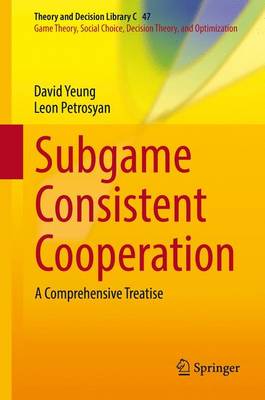Theory and Decision Library C
2 primary works
Book 47
Strategic behavior in the human and social world has been increasingly recognized in theory and practice. It is well known that non-cooperative behavior could lead to suboptimal or even highly undesirable outcomes. Cooperation suggests the possibility of obtaining socially optimal solutions and the calls for cooperation are prevalent in real-life problems. Dynamic cooperation cannot be sustainable if there is no guarantee that the agreed upon optimality principle at the beginning is maintained throughout the cooperation duration. It is due to the lack of this kind of guarantees that cooperative schemes fail to last till its end or even fail to get started. The property of subgame consistency in cooperative dynamic games and the corresponding solution mechanism resolve this "classic" problem in game theory.
This book is a comprehensive treatise on subgame consistent dynamic cooperation covering the up-to-date state of the art analyses in this important topic. It sets out to provide the theory, solution techniques and applications of subgame consistent cooperation in a wide spectrum of paradigms for analysis which includes cooperative dynamic game models with stochastic state dynamics, with uncertain future payoffs, with asynchronous players' horizons, with random cooperation duration, with control spaces switching and with transferable and nontransferable payoffs. The book would be a significant research reference text for researchers in game theory, economists, applied mathematicians, policy-makers, corporate decision-makers, and graduate students in applied mathematics, game theory, decision sciences, economics and management sciences.
Book 50
Durable strategies that have prolonged effects are prevalent in real-world situations. Revenue-generating investments, toxic waste disposal, long-lived goods, regulatory measures, coalition agreements, diffusion of knowledge, advertisement and investments to accumulate physical capital are concrete and common examples of durable strategies. This book provides an augmentation of dynamic game theory and advances a new game paradigm with durable strategies in decision-making schemes. It covers theories, solution techniques, and the applications of a general class of dynamic games with multiple durable strategies. Non-cooperative equilibria and cooperative solutions are derived, along with advanced topics including random termination, asynchronous game horizons, and stochastic analysis. The techniques presented here will enable readers to solve numerous practical dynamic interactive problems with durable strategies.
This book not only expands the scope of applied dynamic game theory, but also provides a solid foundation for further theoretical and technical advancements. As such, it will appeal to scholars and students of quantitative economics, game theory, operations research, and computational mathematics.
"Not too many new concepts have been introduced in dynamic games since their inception. The introduction of the concept of durable strategies changes this trend and yields important contributions to environmental and business applications."
Dusan M Stipanovic, Professor, University of Illinois at Urbana-Champaign
"Before this book, the field simply did not realize that most of our strategies are durable and entail profound effects in the future. Putting them into the mathematical framework of dynamic games is a great innovative effort."
Vladimir Turetsky, Professor, Ort Braude College
"Durable-strategies Dynamic Games is truly a world-leading addition to the field of dynamic games. It is a much needed publication to tackle increasingly crucial problems under the reality of durable strategies."
Vladimir Mazalov, Director of Mathematical Research, Russian Academy of Sciences & President of the International Society of Dynamic Games

